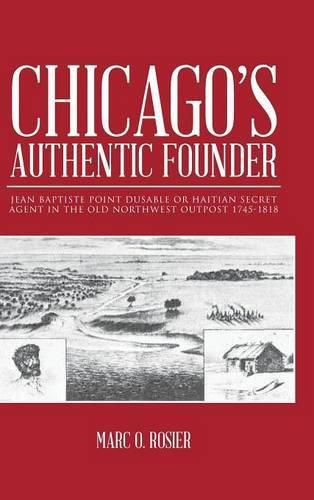Readings Newsletter
Become a Readings Member to make your shopping experience even easier.
Sign in or sign up for free!
You’re not far away from qualifying for FREE standard shipping within Australia
You’ve qualified for FREE standard shipping within Australia
The cart is loading…






This title is printed to order. This book may have been self-published. If so, we cannot guarantee the quality of the content. In the main most books will have gone through the editing process however some may not. We therefore suggest that you be aware of this before ordering this book. If in doubt check either the author or publisher’s details as we are unable to accept any returns unless they are faulty. Please contact us if you have any questions.
Chicago’s Authentic Founder traces the life and time of Jean Baptiste Point DuSable from Haiti through Louisiana, Peoria, Chicago, and Saint-Charles, Missouri, where he died in 1818. It examines important historical events such as the foundation of Chicago, George Rogers Clark’s conquest of the French villages in Illinois, and DuSable’s arrest and appointment as manager of the Pinery in Michigan. The extent of DuSable’s Chicago business or trading post is treated in full. DuSable’s life in Saint-Charles is recounted in light of various court documents. His relationship to and leadership of the Pottawatomi tribe is explored and analyzed in ways that correct many of the inaccuracies found in the accounts publicized by the Kinsies and their allies. This volume contains many photos depicting DuSable’s grave site, former places of residence, artistic representation, the cabin along the Chicago River, etc. DuSable’s place of origin-Saint-Domingue, today’s Haiti-as represented by Juliette Kinsie’s Wau-Bun, is fully explored. The aggression of the European colonial powers and of the United States against Haiti after the successful Haitian Revolution and subsequent Haitian sponsorship of abolitionist and revolutionary activities is explored at length to show the reader possible motivation for associating DuSable with Haiti. Though widely admired by Native Americans and the older class of settlers in the contested territories of Illinois, Indiana, and Michigan, new American settlers, who arrived in Chicago after the building of Fort Dearborn, sought to discredit DuSable so and erroneously credit John Kinzie as Chicago’s founder.
$9.00 standard shipping within Australia
FREE standard shipping within Australia for orders over $100.00
Express & International shipping calculated at checkout
This title is printed to order. This book may have been self-published. If so, we cannot guarantee the quality of the content. In the main most books will have gone through the editing process however some may not. We therefore suggest that you be aware of this before ordering this book. If in doubt check either the author or publisher’s details as we are unable to accept any returns unless they are faulty. Please contact us if you have any questions.
Chicago’s Authentic Founder traces the life and time of Jean Baptiste Point DuSable from Haiti through Louisiana, Peoria, Chicago, and Saint-Charles, Missouri, where he died in 1818. It examines important historical events such as the foundation of Chicago, George Rogers Clark’s conquest of the French villages in Illinois, and DuSable’s arrest and appointment as manager of the Pinery in Michigan. The extent of DuSable’s Chicago business or trading post is treated in full. DuSable’s life in Saint-Charles is recounted in light of various court documents. His relationship to and leadership of the Pottawatomi tribe is explored and analyzed in ways that correct many of the inaccuracies found in the accounts publicized by the Kinsies and their allies. This volume contains many photos depicting DuSable’s grave site, former places of residence, artistic representation, the cabin along the Chicago River, etc. DuSable’s place of origin-Saint-Domingue, today’s Haiti-as represented by Juliette Kinsie’s Wau-Bun, is fully explored. The aggression of the European colonial powers and of the United States against Haiti after the successful Haitian Revolution and subsequent Haitian sponsorship of abolitionist and revolutionary activities is explored at length to show the reader possible motivation for associating DuSable with Haiti. Though widely admired by Native Americans and the older class of settlers in the contested territories of Illinois, Indiana, and Michigan, new American settlers, who arrived in Chicago after the building of Fort Dearborn, sought to discredit DuSable so and erroneously credit John Kinzie as Chicago’s founder.